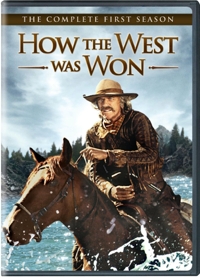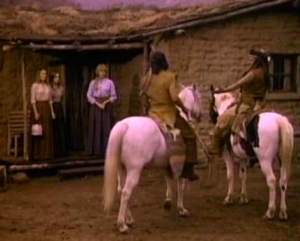 Grade: B
Grade: B
Entire family: No
1976-77, 398 min. (counting pilot), Color
Would be PG for some violence
Warner Bros.
Aspect ratio: 1.33:1
Featured audio: Dolby Digital Mono
Bonus features: Pilot movie
Westward expansion and the American pioneer experience have always been romanticized, and with good reason. Even more than the American Revolution, it’s our national founder’s myth, with pioneers embodying the kind of traits and characteristics that our country values—things like stoicism, toughness, risk-taking, candor, and a can-do attitude.
All of that is present and accounted for in How the West Was Won, a 1977 TV Western that gave James Arness a chance to immortalize another Western character after his Marshal Dillon and Gunsmoke ended their 20-year run.
How the West Was Won didn’t last nearly as long, but it’s not for lack of quality. Arness is both believable and likable as a grizzled old mountain man who comes to visit his brother’s family at the beginning of the Civil War and ends up guiding them westward through Indian country to the Pacific Northwest.
One scene is particularly memorable. The family—including two girls, and two boys—enthusiastically embarks on the journey, but not long into it the older girl complains that she’s been bounced around until she’s sore, she’s covered with dust, her hair is caked with dirt, and she hasn’t been able to bathe in weeks because they need their water for drinking.
Now THAT’S realism. There’s a good deal of attention to detail in this TV mini-series, which was launched as a two-hour made-for-TV movie (The Macahans) that’s also included in this Complete First Season DVD. The rest of what is being called Season 1 consists of three two-hour segments (280 minutes, without commercials), making it, really, a TV miniseries. And like most miniseries, it’s also a little soapy.
 How the West Was Won is a curious combination of realistic drama and soap opera melodrama—which creeps in steadily until it matches the realism pound for pound. That’s not a total slam, because it helps us care about the characters and their situations more than straight realism would. There are subtle moral issues presented as well, with one of the Macahans (Bruce Boxleitner, Scarecrow and Mrs. King) on the run for deserting the Army during the Civil War (with a pretty good anti-war message presented) and then adding to his problems by killing men in situations that couldn’t be avoided. Yes, it’s a Western, so there’s some violence. But it’s not celebrated or showcased. It’s incidental. And yes, there are other adult situations, but again, it’s all handled in a very understated manner, with nothing shown on camera.
How the West Was Won is a curious combination of realistic drama and soap opera melodrama—which creeps in steadily until it matches the realism pound for pound. That’s not a total slam, because it helps us care about the characters and their situations more than straight realism would. There are subtle moral issues presented as well, with one of the Macahans (Bruce Boxleitner, Scarecrow and Mrs. King) on the run for deserting the Army during the Civil War (with a pretty good anti-war message presented) and then adding to his problems by killing men in situations that couldn’t be avoided. Yes, it’s a Western, so there’s some violence. But it’s not celebrated or showcased. It’s incidental. And yes, there are other adult situations, but again, it’s all handled in a very understated manner, with nothing shown on camera.
Whether How the West Was Won qualifies as a winning option for family movie night depends on how your family responds to Westerns. As a miniseries it’s not as compelling as Centennial, but How the West Was Won still features some solid writing, great location filming, and characters that you care about. It’s also a portrayal of pioneer life that’s less whitewashed and romanticized than we normally see.


Leave a comment